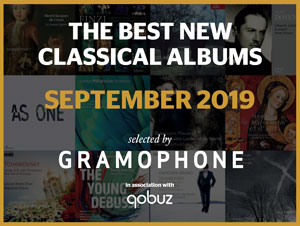The five unmissable new classical recordings this week, featuring Nicola Benedetti, Leif Ove Andsnes, Ruth Gipps and Eleonora Buratto
Jonathan Whiting
Friday, April 11, 2025
This week – Liszt’s Via Crusis, Beethoven’s Violin Concerto, premiere recordings of Ruth Gipps's orchestral works, and a glimpse into 17th century Scandinavia


Leif Ove Andsnes explores the spiritual and introspective side of Liszt in this new Sony Classical release, centred on Via Crucis – a rarely performed meditation on the Stations of the Cross, scored for piano and choir. Joining Andsnes is the Norwegian Soloists’ Choir under Grete Pedersen, recorded in a resonant Oslo church using a restored 1917 Steinway chosen for its fragility and tonal clarity.
In a recent Gramophone podcast, Andsnes describes Via Crucis as ‘an encounter with Liszt’s soul … a man grappling with the mysteries of faith, redemption and human suffering.’ He highlights the music’s austerity, chromaticism and tonal ambiguity, calling it ‘lost music… full of tension, resignation and stillness.’
The album also features the six Consolations, early lyrical works revisited later in Liszt’s life, and two movements from Harmonies poétiques et religieuses. Together, the programme offers a cohesive portrait of Liszt’s sacred and late piano writing.
Nicola Benedetti’s new recording of Beethoven’s Violin Concerto in D major with the Aurora Orchestra and Nicholas Collon marks the ensemble’s first full concerto performed and recorded entirely from memory. Released by Decca Classics, the album was recorded at Alexandra Palace in July 2024 and features newly adapted cadenzas co-written with Petr Limonov, drawing on Beethoven’s own for the piano transcription.
Speaking about the work, Benedetti says, ‘The solo line of this concerto was born out of an improvisatory spirit, with a lightness of touch soon to be out of fashion, with a virtuosity of integrity and poise … I think of it looking upwards with its optimism: and of course, optimism is always most powerful in the face of adversity. That’s the Beethoven that breaks our heart and tears at our soul. But he always keeps us looking upwards, he always gives us hope.’
The first-movement cadenza includes a dialogue with timpani – played here by Henry Baldwin – mirroring Beethoven’s own innovative use of percussion. The orchestra’s layout and rehearsal process were adapted to reflect the concerto’s symphonic qualities and collaborative interplay between soloist and ensemble.
Soprano Eleonora Buratto makes her solo album debut with Indómita, a collection of 19th-century Italian opera scenes recorded with the Orchestra and Chorus of the Opera Carlo Felice Genova, conducted by Sesto Quatrini. The programme includes excerpts from Bellini’s Il pirata, Donizetti’s Anna Bolena and Lucrezia Borgia, and Verdi’s I due Foscari and Aroldo.
These selections reflect repertoire closely associated with Buratto’s recent stage performances and focus on roles that combine lyrical and dramatic vocal demands. The album also features contributions from mezzo-soprano Irene Savignano, tenor Didier Pieri, and bass Giovanni Battista Parodi. All performers make their Pentatone label debut with this release.
Following their acclaimed Perpetual Night, Sébastien Daucé and Ensemble Correspondances turn their attention to 17th-century sacred music from the courts of Northern Europe. Northern Light focuses on repertoire from Sweden, Denmark, and German-speaking territories with cultural links to the Baltic region.
The programme includes works by composers active in or connected to the Scandinavian courts, such as Franz Tunder’s Ack Herre, låt dina helga änglar and Jubilate et exultate (the latter celebrating King Charles XI of Sweden), Johann Philipp Krieger’s Swedish-language motet I frid vill jag nu fara, and Christoph Bernhard’s expressive Ach, daß ich Wasser’s g'nug hätte. Other highlights include a suite by Sebastian Knüpfer and sacred works by Christian Geist, Johann Fischer, and Vincenzo Albrici.
The latest instalment in Chandos’s extensive survey of Ruth Gipps’s orchestral output continues to shine a light on this underrepresented British composer and conductor. Composed in 1943 for her elder brother Bryan, the Violin Concerto is performed here by Charlie Lovell-Jones. Leviathan, a rare showpiece for contrabassoon and orchestra from the late 1960s, featuring BBC Philharmonic contrabassoonist Bill Anderson. The programme is completed by the substantial Symphony No 5, written in 1982 and dedicated to William Walton. Scored for large orchestral forces – two harps and quadruple winds – its final movement adopts the structure of a Missa brevis without words. Rumon Gamba and the BBC Philharmonic continue to build an unassailable case for Gipps’s place in the orchestral canon.


Reviews for these albums can be found in Gramophone's Reviews Database – Subscribe today!











